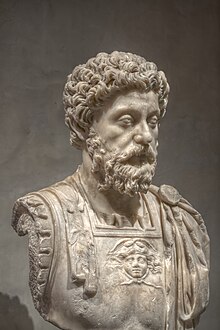Marcus Aurelius
| Marcus Aurelius Antoninus Augustus | |||||
|---|---|---|---|---|---|

|
|||||
| Joint 16th Emperor of the Roman Empire | |||||
| Reign | 8 March 161 – 17 March 180 | ||||
| Predecessor | Antoninus Pius | ||||
| Successor | Commodus | ||||
| Co-emperors |
Lucius Verus (161–169) Commodus (177–180) |
||||
| Born |
26 April 121 Rome |
||||
| Died | 17 March 180 (aged 58) Vindobona or Sirmium |
||||
| Burial | Hadrian's Mausoleum | ||||
| Issue | 14, incl. Commodus, Marcus Annius Verus, Antoninus and Lucilla | ||||
|
|||||
| Dynasty | Antonine | ||||
| Father |
|
||||
| Mother | Domitia Lucilla | ||||
| Full name | |
|---|---|
|
Marcus Annius Catilius Severus (as emperor) |
Marcus Annius Catilius Severus
(or Marcus Catilius Severus;
birth to marriage)
Marcus Annius Verus
(marriage to adoption by Antoninus Pius)
Marcus Aelius Aurelius Verus Caesar
(as imperial heir)
Marcus Aurelius (/ɔːˈriːliəs/; Latin: Marcus Aurelius Antoninus Augustus; 26 April 121 – 17 March 180 CE) was Roman Emperor from 161 to 180. He ruled with Lucius Verus as co-emperor from 161 until Verus' death in 169. Marcus Aurelius was the last of the so-called Five Good Emperors. He was a practitioner of Stoicism, and his untitled writing, commonly known as the Meditations, is the most significant source of the modern understanding of ancient Stoic philosophy.
During his reign, the Empire defeated a revitalized Parthian Empire in the East: Aurelius' general Avidius Cassius sacked the capital Ctesiphon in 164. In central Europe, Aurelius fought the Marcomanni, Quadi, and Sarmatians with success during the Marcomannic Wars, although the threat of the Germanic tribes began to represent a troubling reality for the Empire. A revolt in the East led by Avidius Cassius failed to gain momentum and was suppressed immediately.
Aurelius' Meditations, written in Greek while on campaign between 170 and 180, is still revered as a literary monument to a philosophy of service and duty, describing how to find and preserve equanimity in the midst of conflict by following nature as a source of guidance and inspiration.
...
Wikipedia
